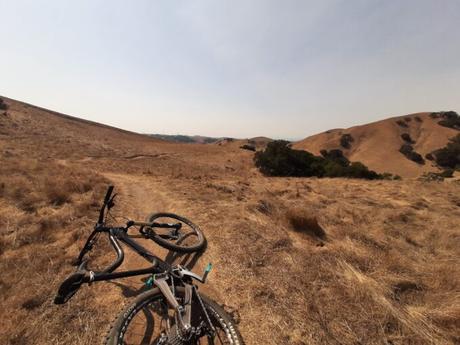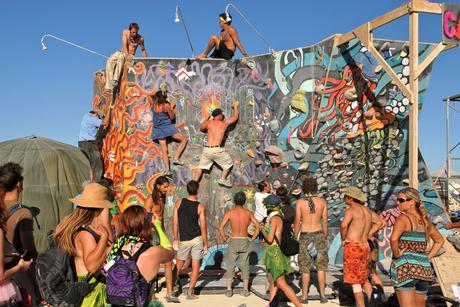My dad never taught me how to ride a bike. At about 12 years old, I learned how to ride a bike that my parents had gotten for my little brother's 6th birthday. Riding bikes became a big part of my life fairly quickly, and if it weren't for the fact that climbing has my heart, I'd probably be either a spandex-wearing slick-tire racer, or putting together epic bikepacking journeys. As it is, I recently picked up a more aggressive, full-suspension rig off of Craigslist, and mountain biking is beginning to compete for my time in a very serious way.

My dad never taught me how to ride a bike because he didn't know how to ride a bike. His parents wouldn't allow him to learn. I ended up teaching him in 2011, because my friends and I had organized a Burning Man camp and invited the family along, and without a bike my dad would've been severely limited on the playa.

Lately I've been lingering on the little idiosyncrasies that made my dad who he was, both as an individual and as a pater familias. I had always enjoyed saying "I taught my dad how to ride a bike," because it's a reversal of a common sentiment (ie fathers teaching sons how to do basic childhood things) that feels almost like wordplay. Nowadays, it reminds me of how toxic and oppressive my dad's mother was, and how unpleasant it was to visit the grandparents, and how little it seemed to bother my dad when his parents died 20-odd years ago, in fairly quick succession.
It's been a little more than a month since my dad, Bruce Lazar Smith, died of lymphoma. He was 73. The cancer, specifically Angio Immunoblastic T-cell Lymphoma (AITL), was diagnosed around the end of spring 2019, after a month of crippling back pain with no apparent cause. During this initial phase, my younger brother Eliot wondered if this would be "the illness that turns dad old." That was about 18 months ago, and it feels like we're just waking up from a nightmare, except that the world kept spinning while we screamed in our sleep.
The Covid dystopia merged with our own personal nightmare, as the cancer came back right around the time the virus was gaining a foothold in Wuhan. Consequently, the many weeks my dad spent in the hospital included the additional horror of solitary confinement. My brother and I, eager to protest racial injustice and police brutality, had to self-isolate in order to be able to help care for our dad when he was at home, but were only allowed to visit when his condition took a turn. Even without Covid, we would've been entirely unprepared for the logistical and emotional clusterfuck of trying to navigate our fractious medical system. This made my heart break for all the families without financial means and solid friends. I suspect many cancers aren't as rare as we think, but rather people simply die before even getting a biopsy. Anyway, there's a lot to digest, but the thing I'm trying to say is that we're a little disoriented at the moment.
The past few weeks have been dominated by what we call "the business of death." When my dad died, the rest of the family suddenly became responsible for his bank accounts, his notes and records from an entire career as a clinical and forensic psychologist, his car, his clothes and shoes and cell phone and gadgets, his friends...you see, my dad didn't get his affairs in order, instead focusing his energy on trying to "beat cancer" and keep up with his work. He wouldn't even talk about what sort of funeral he might want. We are all trying our best not to resent him for leaving us with a mess. We're trying to treat it like a treasure hunt.
Pops was a lot like The Dude in The Big Lebowski, in that he was a very passive character (I'm not talking about being a lazy stoner, although he did smoke pot in the 60s. If you watch Big Lebowski closely, you'll notice that The Dude doesn't incite a single thing, but rather things happen to him). His father, Irving, served as an interpreter during WWII, and became a painter after the war. My dad's birth certificate lists Irving's occupation as "Artist." Shortly thereafter, he went to work at a hardware store, owned by his father-in-law. Essentially, my grandmother Dolly decreed that a steady income was essential, and rather than pursue his passion, Irv oughta settle down. She also decreed her princely Jewish son Bruce was the most precious thing in the world, which of course meant no dangerous activities like riding bikes. Her deification of my father also had the side-effect of poisoning my dad's relationship with his younger sister. I always found it strange that someone as incisive and observant as my father couldn't at least acknowledge that his mother was kind of awful. I suppose that if my dad were to acknowledge such a thing, he may have had to change course, and he was much more content to drift with the winds.
Maybe instead of "passive," we could call my dad accepting. He loved trying to figure out what made people tick, and was never threatened by people with strongly worded opposing viewpoints. Looking back on my various lashings out during adolescence, I sometimes can't believe the patience with which he'd calmly and non-judgmentally point out the fallacy in my position. And he understood that it was futile to try to stop me from doing what I was gonna do. Instead, he actively encouraged my brother and I in sports, academics, or whatever we showed any interest in. I'm realizing that my dad was, intentionally or not, applying a parenting technique diametrically opposed to the one Dolly used on him. And I'd say it was to our benefit.
And yet it's our father's "passivity" that has my brother and I "accepting" the responsibility of cleaning out the house. Sometimes it's a fun-filled easter egg hunt. Sometimes it's exasperating. It is rather time-consuming.
I'm not really sure what else to say at the moment. This isn't supposed to be one of those Curriculum Vitae newspaper obits, it's a personal tribute on a barely-read blog, and it felt important to write something. I had an awesome dad, and most of the time I'm grateful for the whole cancer experience, as painful and shitty as it was in the moment, because it brought the family much closer together. We all learned a lot. We're still cycling through anger, disbelief, despair, etc., but the edges are a little duller, and life is starting to come back into sharper focus. Vikki and I are in pretty poor climbing shape, but it seems like the forced rest was good for old injuries, and besides, there are bikes to ride. We're starting to look forward again.
